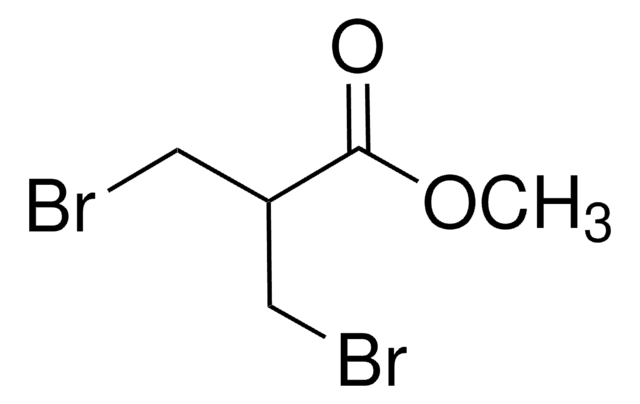About This Item
Fórmula empírica (Notação de Hill):
C14H9Cl
Número CAS:
Peso molecular:
212.67
Número CE:
Número MDL:
Código UNSPSC:
12352100
ID de substância PubChem:
NACRES:
NA.22
Produtos recomendados
Ensaio
95%
forma
solid
pf
77-80 °C (lit.)
densidade
1.171 g/mL at 25 °C (lit.)
grupo funcional
chloro
cadeia de caracteres SMILES
Clc1cccc2cc3ccccc3cc12
InChI
1S/C14H9Cl/c15-14-7-3-6-12-8-10-4-1-2-5-11(10)9-13(12)14/h1-9H
chave InChI
SRIHSAFSOOUEGL-UHFFFAOYSA-N
Descrição geral
1-Chloroanthracene forms photodimer trans-bi(1-chloro-9,10-dihydro-9,10-anthracenediyl) via the solid-state [4+4]-photodimerization.
Aplicação
1-Chloroanthracene was used to investigate the effect of polycyclic aromatic hydrocarbons on gap junctional intercellular communication and activation of intracellular receptor kinase in F344 rat liver epithelial cells.
Código de classe de armazenamento
11 - Combustible Solids
Classe de risco de água (WGK)
WGK 3
Ponto de fulgor (°F)
Not applicable
Ponto de fulgor (°C)
Not applicable
Equipamento de proteção individual
Eyeshields, Gloves, type N95 (US)
Certificados de análise (COA)
Busque Certificados de análise (COA) digitando o Número do Lote do produto. Os números de lote e remessa podem ser encontrados no rótulo de um produto após a palavra “Lot” ou “Batch”.
Já possui este produto?
Encontre a documentação dos produtos que você adquiriu recentemente na biblioteca de documentos.
Os clientes também visualizaram
A M Rummel et al.
Toxicological sciences : an official journal of the Society of Toxicology, 49(2), 232-240 (1999-07-23)
Many polycyclic aromatic hydrocarbons (PAHs) are known carcinogens. A considerable amount of research has been devoted to predicting the genotoxic, tumor-initiating potential of PAHs based on chemical structure. However, information on the correlation of structure with the non-genetoxic, epigenetic events
Ilona Turowska-Tyrk et al.
Acta crystallographica. Section C, Crystal structure communications, 60(Pt 2), o146-o148 (2004-02-10)
Crystals of the 1-chloroanthracene photodimer, viz. trans-bi(1-chloro-9,10-dihydro-9,10-anthracenediyl), C(28)H(18)Cl(2), were obtained from the solid-state [4+4]-photodimerization of the monomer, C(14)H(9)Cl, followed by recrystallization. The symmetry of the product molecules is defined by the orientation of the reactant molecules in the crystal. The
Miki Sato et al.
The Analyst, 142(23), 4560-4569 (2017-11-09)
The detection limits and photoionization thresholds of polycyclic aromatic hydrocarbons and their chlorides and nitrides on the water surface are examined using laser two-photon ionization and single-photon ionization, respectively. The laser two-photon ionization methods are highly surface-selective, with a high
Diógenes Herreno-Sáenz et al.
International journal of environmental research and public health, 3(2), 191-195 (2006-07-11)
Since the finding in the 1930s, a large number of polycyclic aromatic hydrocarbons (PAHs) of different structures have been tested for potential tumorigenicity. Structure-activity relationships of halo-PAHs have been investigated to determine the regions of a PAH that may be
Rong Jin et al.
Journal of chromatography. A, 1509, 114-122 (2017-06-18)
Isotopic dilution gas chromatography combined with high resolution mass spectrometry (GC/HRMS) has overwhelming advantages with respect to the accuracy of congener-specific ultratrace analysis of complex persistent organic pollutants (POPs) in environmental matrices. However, an isotopic dilution GC/HRMS method for analysis
Nossa equipe de cientistas tem experiência em todas as áreas de pesquisa, incluindo Life Sciences, ciência de materiais, síntese química, cromatografia, química analítica e muitas outras.
Entre em contato com a assistência técnica












